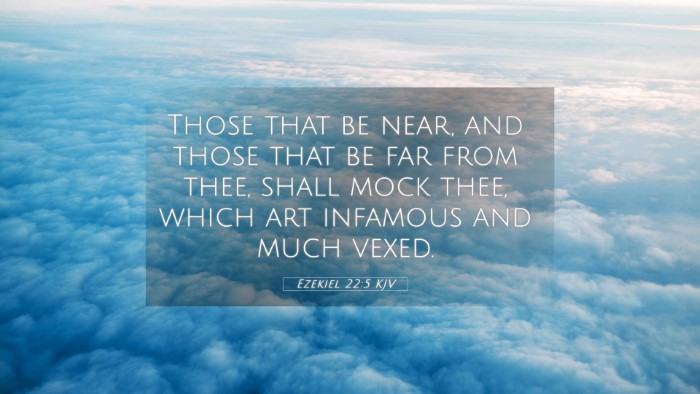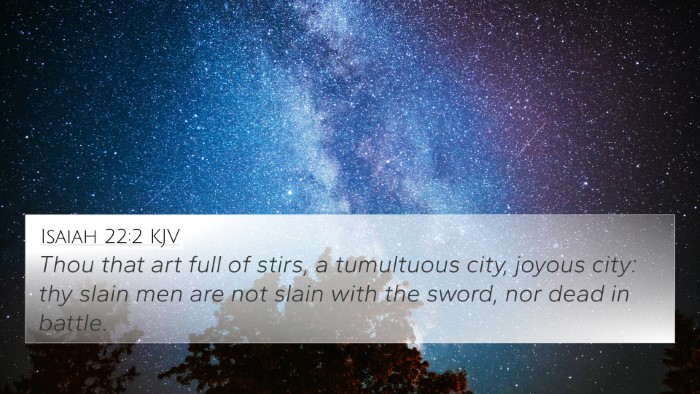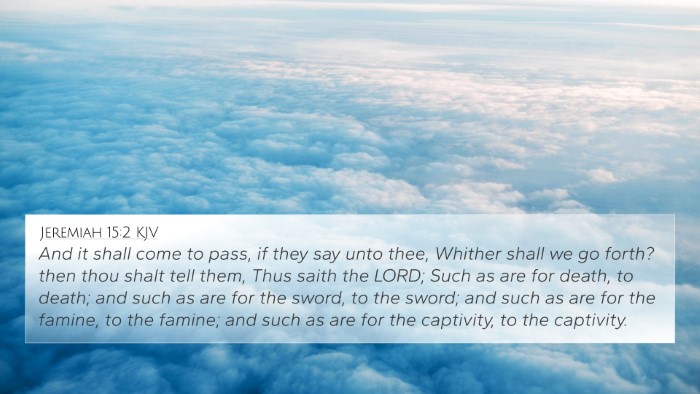Ezekiel 22:5 - Summary and Interpretation
Bible Verse: Ezekiel 22:5 (KJV)
"Those who are near and those who are far from you will mock you; your name is defiled, and the world is full of chaos."
Meaning and Insights
This verse from the book of Ezekiel conveys a poignant message about the state of Jerusalem and serves as a prophetic indictment against the nation's sinfulness. Let us explore the insights gleaned from respected public domain commentaries, including those by Matthew Henry, Albert Barnes, and Adam Clarke.
Contextual Analysis
The prophet Ezekiel, a contemporary of Jeremiah, was active during the Babylonian exile and communicated God’s disapproval of Israel's idolatry and moral decay.
- Judgment Against Jerusalem: Ezekiel's prophecies often contain descriptions of Jerusalem's moral failures and the divine judgment that follows.
- Defilement of God's Name: The phrase "your name is defiled" indicates that Israel's actions have brought dishonor to God, further emphasizing the seriousness of their sins.
- Mockery from Others: The verse highlights how even those outside the covenant community recognize the unfaithfulness and chaos that characterize Jerusalem. It serves as a warning about the repercussions of sin, not only for the individual but for the community as a whole.
Commentary Insights
Matthew Henry: He notes that this verse emphasizes both the internal and external consequences of Israel's sins. It speaks to a sense of collective shame among the people as well as the external perspective of surrounding nations which view Jerusalem with disdain. Henry elaborates that the mockery signifies both disapproval and a reflection of God's judgment.
Albert Barnes: Barnes highlights that the judgments proclaimed by Ezekiel are set against a backdrop of historical context. He draws attention to the impending doom that Jerusalem faces due to its transgressions. The mention of mockery illustrates how divine judgment leads to a loss of respect among nations.
Adam Clarke: Clarke discusses the deeper implications of God's name being defiled. He emphasizes that a failure to uphold God's laws leads not only to divine judgment but also tarnishes the community’s reputation. He asserts that the world’s chaos denotes both moral disorder and a judgment against those who should know better.
Cross-References
This verse connects to several others throughout the Bible, shedding light on the themes of sin, God’s judgment, and the call for repentance:
- Isaiah 52:5: Discusses how God's people are mocked for having forsaken Him.
- Jeremiah 24:9: Explains how God scatters those who turn away from Him, becoming a reproach.
- Ezekiel 36:20-23: Relays how Israel has profaned God's name among the nations.
- Romans 2:24: Paul reminds believers that God's name is blasphemed among the Gentiles due to sin.
- Isaiah 1:7: Highlights the desolation within Judah due to sinfulness.
- Jeremiah 6:15: Describes how people are indifferent to their sins, without shame.
- 2 Chronicles 36:16: Contains warnings about God’s judgment toward those who disregard Him.
Conclusion
Understanding Ezekiel 22:5 is pivotal for grasping the broader themes of judgment and accountability present in Biblical narratives. The interconnectedness and cross-referencing between these scriptures enrich our knowledge and underscore the importance of relational obedience to God.
Tools for Bible Cross-Referencing
For those interested in further exploration, utilizing tools for cross-referencing can be exceedingly beneficial. Here are some recommended resources:
- Bible concordance for finding synonyms and themes.
- Bible cross-reference guide to link thematically related verses.
- Comprehensive Bible cross-reference materials for deeper study.
- Methods for cross-referencing Bible study to enhance understanding.
Final Thoughts
Ultimately, Ezekiel 22:5 serves as a clarion call for both the ancient community and contemporary readers to heed the importance of living righteously and maintaining a relationship with God. As we analyze and connect various scriptures, we can better understand the profound wisdom contained within the Bible, allowing us to draw impactful lessons that resonate through time.




